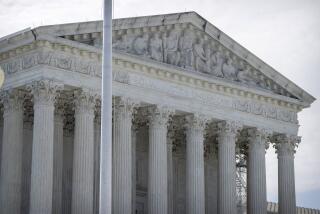Judge’s Health Care Ruling Hits Bush at Home
CINCINNATI — Texas Gov. George W. Bush, who has campaigned on his record of caring for needy Texans, was caught flat-footed Wednesday by a federal court ruling that said his state has not provided adequate medical care for poor children.
U.S. District Judge William Wayne Justice ruled earlier this month that Texas had not lived up to a 1996 legal agreement to improve children’s access to Medicaid and to fix other problems in health care for the poor.
Although the ruling was filed Aug. 14 and the state attorney general’s office was aware of it, neither Bush nor his campaign staff had heard of the decision until Wednesday when they were peppered with questions about it.
Bush landed here at the end of a campaign day--which began in New Hampshire, touched down in Pennsylvania, started out on education and warmed up with gibes at the Clinton administration--only to be asked repeatedly about the decision.
Attorney General to Appeal Ruling
Bush said he hadn’t seen it and did not know about it until Wednesday.
“I look forward to seeing exactly what [Justice] was referring to,” Bush said. “But we’ve got a good record in signing up children for Medicaid and we’re going to continue to do so.”
The state attorney general will appeal the ruling, said Karen Hughes, Bush’s communications director. “The state emphatically disagrees with the findings of this very activist liberal judge,” she said.
The federal court decision stated, among other things, that Texas is not providing adequate dental care for children receiving Medicaid, that checkups under the program’s managed care arm are inadequate, and that fewer than 10% of children are receiving immunizations, according to Associated Press.
Vice President Al Gore’s campaign--which has focused this week on proposals for covering uninsured children--pounced on the issue. Gore spokeswoman Kym Spell said the ruling “is just the latest evidence that Gov. Bush’s policies have left countless families in Texas without health insurance--most tragically children.”
Campaigning Wednesday in Erie, Pa., Bush levied charges as well, saying America has endured an administration unable to provide leadership on everything from Social Security to education. And he touted his new plan to help make advanced schooling more widely available.
The nearly $7-billion, five-year plan would, among other measures, increase the existing federal Pell grant program for first-year college students to $5,100 from $3,300, which the campaign said would help an estimated 800,000 more students annually to start--and complete--college.
During a speech that touched on all of his education proposals to date, Bush said that his college plan would “help a child access the universities of this country. It’ll help a child stay in college as well.”
At an airport rally before the education speech in the battleground state of Pennsylvania, Bush lit into the Clinton administration.
“After seven years of failed leadership and failed policy, I’m asking America to give me a chance to work with both Republicans and Democrats to make sure our seniors have got prescription drug coverage,” Bush said. “After seven years of talk and no leadership, it’s time to get a new leader to Washington and do something about Social Security.”
Bush started his day in Hampton, N.H., where he unveiled the higher education plan, which would also kick off a merit scholarship program to be molded by the states. Dubbed a “college challenge grant,” Bush said the federal government would pay $1.5 billion--or one-third of the cost for such an effort.
It would also allow parents to prepay tuition or take part in tuition savings programs for kindergarten through college without having to pay taxes on the money.
Bush in Internet-TV Interview
A day after his campaign staff said it was looking into high-tech options for three fall debates, the Republican nominee for president also took part in his first simultaneous Internet-television interview.
Bush fielded questions that came in via CNN.com--some in real time--on issues ranging from Social Security to his tax plan, school violence to school vouchers.
Asked whether he thought that a presidential candidate could be elected without running negative ads, Bush sounded a lot like President Clinton when he said: “I guess it all depends on your definition of negative ads.”
Although he believes that “you can win a campaign without tearing someone apart,” he did say that “comparative ads are fair.”
He was also asked how he planned to reach out to the thousands of America’s neediest children, who are eligible for federally funded Medicaid insurance but are not receiving the benefit, which is administered by the states.
Bush’s response was a testy defense of Texas’ efforts to insure children who have no health coverage. In addition to the recent federal court filing, Texas has come under the gun for the way it administers the Children’s Health Insurance Program, a federal effort designed to get health care to children of the working poor.
“I’ve heard the political rhetoric saying we don’t want to sign up children to our Children’s Health Insurance Program, and that’s just not the truth,” he said. “Our state of Texas is a compassionate state. . . . We’re actively signing up children to the Children’s Health Insurance program.”
In fact, Hughes points to the program as proof of Bush’s positive Texas record in light of the federal court filing. That filing was the most recent step in many years of litigation.
The original suit to improve Medicaid for young Texans dates back to 1993, during the tenure of Bush’s Democratic predecessor, Gov. Ann Richards. The consent decree--nearly 150 measures that the state agreed to take--was finalized in 1996, during Bush’s first term as governor.
“Since that time, Texas has significantly increased access, enrollment and funding for Medicaid,” Hughes said.
More to Read
Sign up for Essential California
The most important California stories and recommendations in your inbox every morning.
You may occasionally receive promotional content from the Los Angeles Times.











